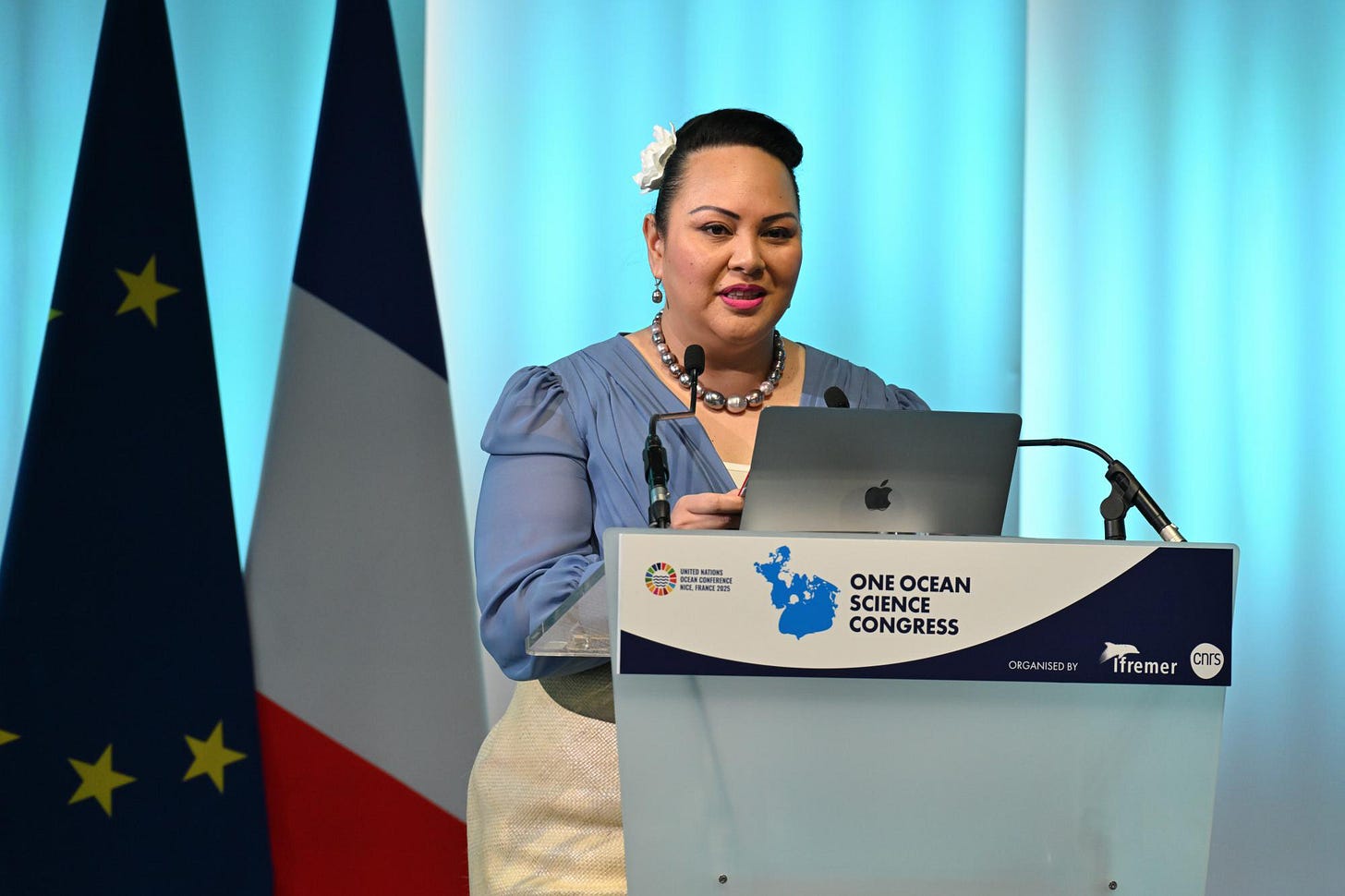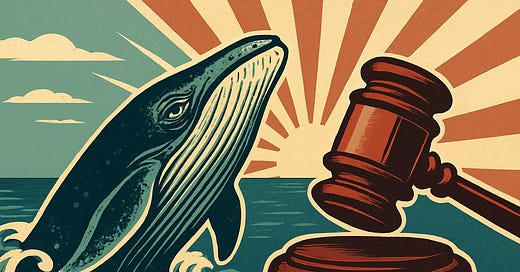I’m a Person Too. The Legal Revolution That Could Save Whales
A new movement, grounded in Indigenous law and legal precedent, seeks to grant whales the right to live, thrive and be heard.
A minke whale is harpooned off the coast of Norway. It thrashes, panicked, wounded, until its spine is crushed and the ocean turns red. In captivity, an orca whale circles endlessly in a chlorinated tank, jaw rubbing raw against the concrete, performing for tourists in exchange for dead fish.
Now imagine if those acts were not legal. Not acceptable. Not even possible.
That is the vision behind a campaign launched without fanfare at the UN Ocean Conference in Nice. No stage lighting. No televised keynote. Just a circle of people gathered in the Green Zone, facing the Mediterranean Sea, a sea echoing with the cries of animals we fail to protect. What happened there could reshape our relationship with the ocean more profoundly than any treaty signed that week.
“The time has come to recognise whales not merely as resources but as sentient beings with inherent rights” - Princess Angelika Lātūfuipeka Tukuʻaho from the Kingdom of Tonga
A new movement was announced: “I’m a Person Too”. Its premise is as bold as it is overdue, to recognise whales not as property, not as resources, but as legal persons.
Legal personhood is a status granted by law to an entity that enables it to hold rights, bear duties and be represented in court. It does not imply that the entity is human. Instead, it reflects the legal system’s recognition that certain interests deserve protection regardless of who holds them.
Led by the Moananui Sanctuary and grounded in Pacific Indigenous leadership, the campaign challenges a deeply embedded legal fiction, that whales are objects. It proposes something radical and necessary. The law must catch up to what science, ethics and culture have long acknowledged. Whales are sentient beings with lives of their own, and those lives have meaning beyond their usefulness to us.
Why Legal Personhood for Whales?
Legal personhood for whales would mean recognising that they have fundamental rights, the right to exist, to thrive in their natural habitats and to be free from harm and exploitation. It would not humanise whales, but it would remove the legal fiction that treats them as objects.
Science has made it impossible to ignore the evidence of whale intelligence. Many species demonstrate self-awareness, social bonds that span decades, vocal learning, cultural transmission, memory and even grief. They coordinate in family groups, teach their young and hold migratory knowledge passed down through generations.
In the eyes of the law, whales are still property. They can be bought, confined, hunted, or killed, often w.ith little to no legal consequence. A fin whale struck by a harpoon may thrash in agony for over half an hour before dying, bleeding out into open water while its family flees. A captive dolphin may spend decades in a concrete tank the length of its body, performing for tourists while its teeth rot and slides into depression These are not anomalies. They are the logical consequence of a legal system that treats sentient life as property. Behind every statistic is a being that suffers, feels, and endures the unimaginable in silence.
Personhood would fundamentally alter that status, offering whales a framework of protection not dependent on conservation targets or moral appeal, but on enforceable rights.
Not Just a Dream - This Is Already Happening
The law already grants personhood to many non-human, non-living entities. Corporations, trusts, governments, and ships are all recognised as legal persons in various jurisdictions. This allows them to enter contracts, sue and be sued and hold assets.
In the natural world, recent years have seen ecosystems recognised as rights-bearing entities. The Whanganui River in New Zealand was granted legal personhood in 2017 after more than a century of Māori advocacy. Colombia’s Constitutional Court recognised the Atrato River in 2016, granting it rights to protection and restoration. Ecuador enshrined the Rights of Nature in its constitution in 2008, allowing rivers, forests and ecosystems to be defended in court.
These cases show that legal personhood is not symbolic or idealistic. It is a working legal tool, already applied across cultures and legal systems.
Have Any Animals Been Granted Legal Personhood?
Several landmark legal decisions have already extended forms of legal personhood or rights to individual animals.
In 2015, an Argentine court declared Sandra, a captive orangutan, to be a “non-human person.” That case made history: for the first time, a court treated a captive animal not as property, but as a rights-holder. The court found that her confinement in Buenos Aires Zoo violated her basic rights and ordered her transfer to a sanctuary in the United States.
In the United States, the Nonhuman Rights Project brought a habeas corpus petition on behalf of Happy, an elephant held alone in the Bronx Zoo. The New York Court of Appeals ultimately ruled against the petition in 2022. Two of the seven judges dissented. They argued that Happy should be recognised as a legal person with the right to bodily liberty. This was the first such endorsement by a U.S. high court.
In 2013, the Indian Ministry of Environment and Forests issued a national ban on dolphinariums. The Ministry declared dolphins to be “non-human persons” based on their intelligence and emotional complexity, leading to nationwide protection for captive cetaceans. Though not a judicial ruling, this policy-level recognition carried the weight of national law.
Courts are not dismissing these arguments out of hand. They are engaging with them. Whales, with their cognitive and social complexity, their suffering and their ecological importance, are among the strongest candidates yet.
A Movement Rooted in Indigenous Law and Ocean Wisdom
The “I’m a Person Too” campaign is grounded in Pacific Indigenous worldviews, where whales are revered as kin, guardians and ancestral beings.
At the launch event in Nice, Princess Angelika Lātūfuipeka Tukuʻaho of Tonga offered a powerful address affirming the deep cultural and spiritual connection between Pacific communities and whales. The campaign is anchored in the Moananui Sanctuary Agreement, a legal and cultural framework based on Rights of Nature and Indigenous stewardship.

Melino Maka, chair of the Huelo Matamoana Trust, has worked alongside Lātūfuipeka Tukuʻaho on this initiative. The trust is actively engaged with legal experts to propose the “Whales (Legal Personhood and Protection) Act 2025,” which builds on Tonga’s legacy as a whale sanctuary. Maka said the trust is collaborating with Tongan ministries and lawmakers to ensure the proposed legislation aligns with Tonga’s Christian and cultural foundations to secure broad support.
Key provisions in the draft bill include recognition of whales as legal persons, their rights to life, migration, a healthy habitat and cultural protection, the establishment of a guardianship framework and legal enforcement powers including the right to initiate proceedings to protect whales. Once refined, the bill is expected to be formally introduced in Tonga’s Parliament.
The effort has already gained global support. In parallel with the UN Ocean Conference, a citizen-led campaign hosted by Avaaz has gathered over 430,000 signatures in support of whale personhood. The petition calls on Pacific Island governments and world leaders to recognise whales as “sentient beings with the right to life, culture and protection from harm”. It urges governments to make history by restoring protections, honouring Indigenous leadership and granting whales the legal standing to seek justice for the centuries of harm inflicted upon them.
This is not performative advocacy. It is the beginning of a serious shift in international law and public morality.
What Legal Personhood Could Do
If whales were granted legal personhood, it would change the legal landscape in profound ways. Harpoons, ship strikes, acoustic trauma and captivity would no longer be administrative matters or conservation statistics. They would become violations of rights.
Personhood would allow lawsuits to be filed on behalf of individual whales or populations. Guardians could be appointed to represent their interests in court. It would shift the burden of proof, requiring governments and industries to justify their actions rather than assuming the right to exploit.
It would also elevate whale habitats, migratory routes, calving grounds, feeding zones, to legally protected spaces. These would be protected not because they serve human purposes, but because they are vital to the rights of whales to exist and thrive.
There are, of course, legal hurdles ahead. Personhood is not a shortcut to sweeping protections. It requires legislative recognition, judicial precedent and robust governance to be meaningful in practice. Opponents will argue that whales cannot hold duties, that rights without responsibilities destabilise legal frameworks. These are serious concerns and deserve serious answers. But rights have never required perfection. They have required courage, consistency and a willingness to evolve the law when justice demands it.
The Next Step in Legal Evolution
No whale has yet been granted legal personhood, but the legal, scientific and ethical case is stronger now than at any point in history. The movement is growing, precedents are building and public awareness is growing too.
As someone who has spent years confronting the legal void around whale welfare, I believe this campaign marks a turning point.
This is no longer a radical idea. It is a real, legal option, and one we can choose.
The law evolves. It always has. The only question is whether it will do so in time. Whether we have the courage to recognise what we already know.
Whales are not things.
They are sentient beings, and more people than ever are ready to recognise that in law.
Your Voice in the Current
The laws that govern our relationship with whales are not set in stone. They were written by people, and they can be rewritten by us.
If you believe recognition should come now, not decades from now, join the movement to make legal personhood for whales a global reality.
🖊 Sign the petition to add your voice to the growing international call.
📢 Share this article with your networks, every conversation started is a step closer to change.
💬 Talk about it. In classrooms, boardrooms, dining rooms. Change begins when silence ends.
Raise your voice before the next harpoon is fired.
References
AFADA v. Buenos Aires Zoo – Sandra the orangutan case, Argentina (2015)
Nonhuman Rights Project, Inc. v. Breheny – Happy the elephant case, New York Court of Appeals (2022)
Ministry of Environment and Forests, Government of India, Dolphinarium ban policy (2013)
Te Awa Tupua (Whanganui River Claims Settlement) Act 2017, New Zealand
Judgment T-622/16, Constitutional Court of Colombia – Atrato River case (2016)
Constitution of Ecuador, Article 71 (2008)
Avaaz Petition: Rights for Whales Campaign, launched May 2025, https://secure.avaaz.org/campaign/en/whales_personhood_loc/







Great to see this Luke. I wrote about this last year here: https://degrowthistheanswer.substack.com/p/what-if-we-gave-nature-legal-rights?utm_source=publication-search
but you've inspired me to write about it again to bring it to more people's attention.
I’m all for it, but why just whales? Why not all sentient beings? How can we continue to be so blindly speciesist? I guess it’s a tangible first step that could lead to humankind waking up to its appalling, socially accepted treatment of other animals.